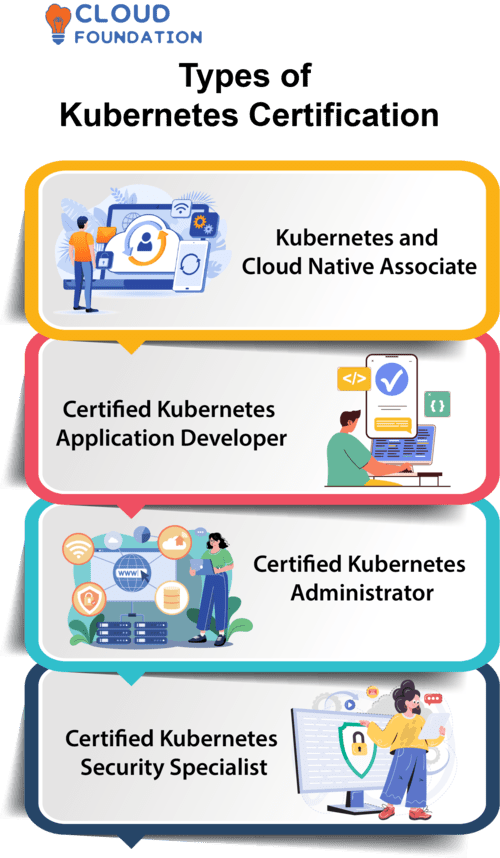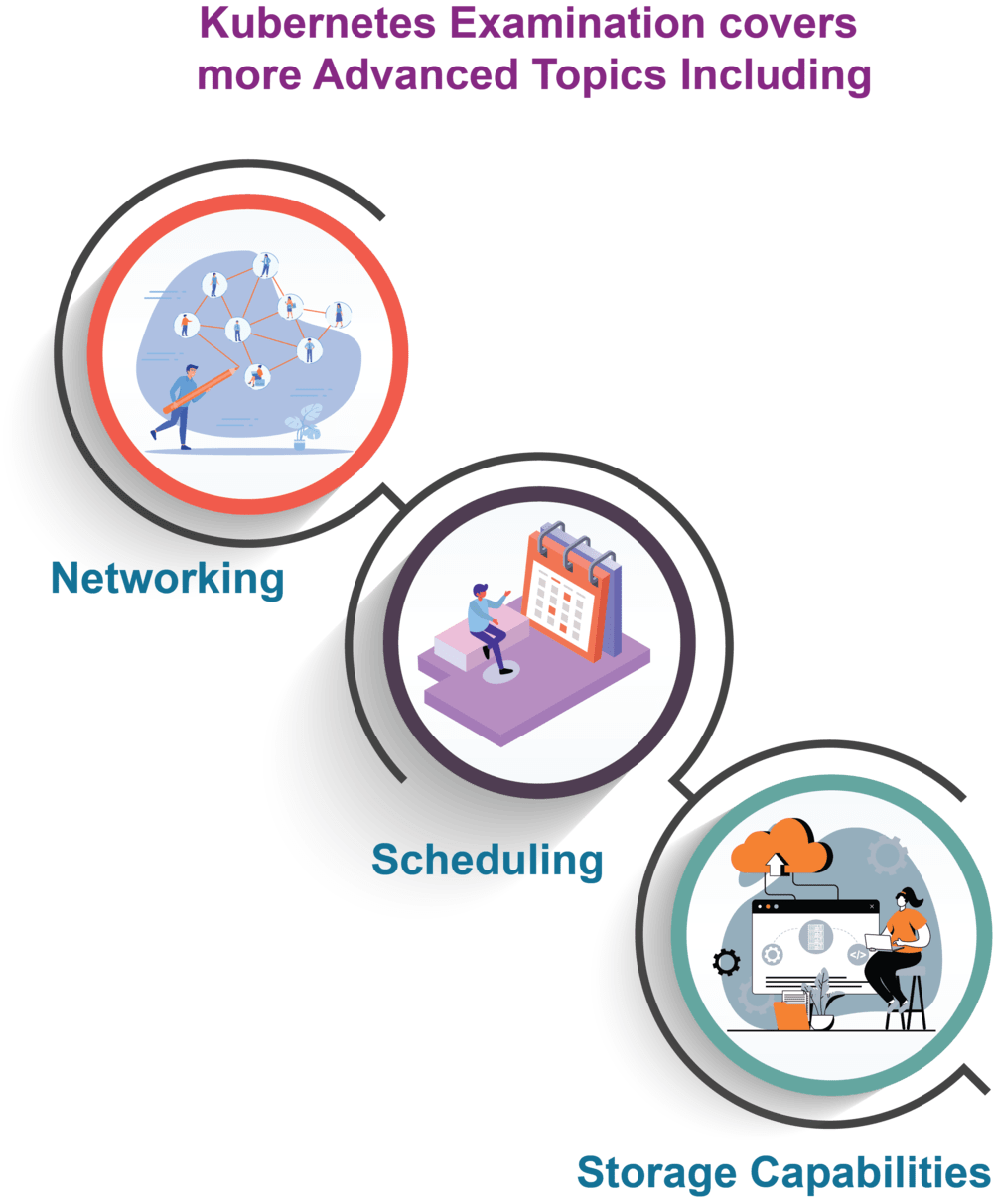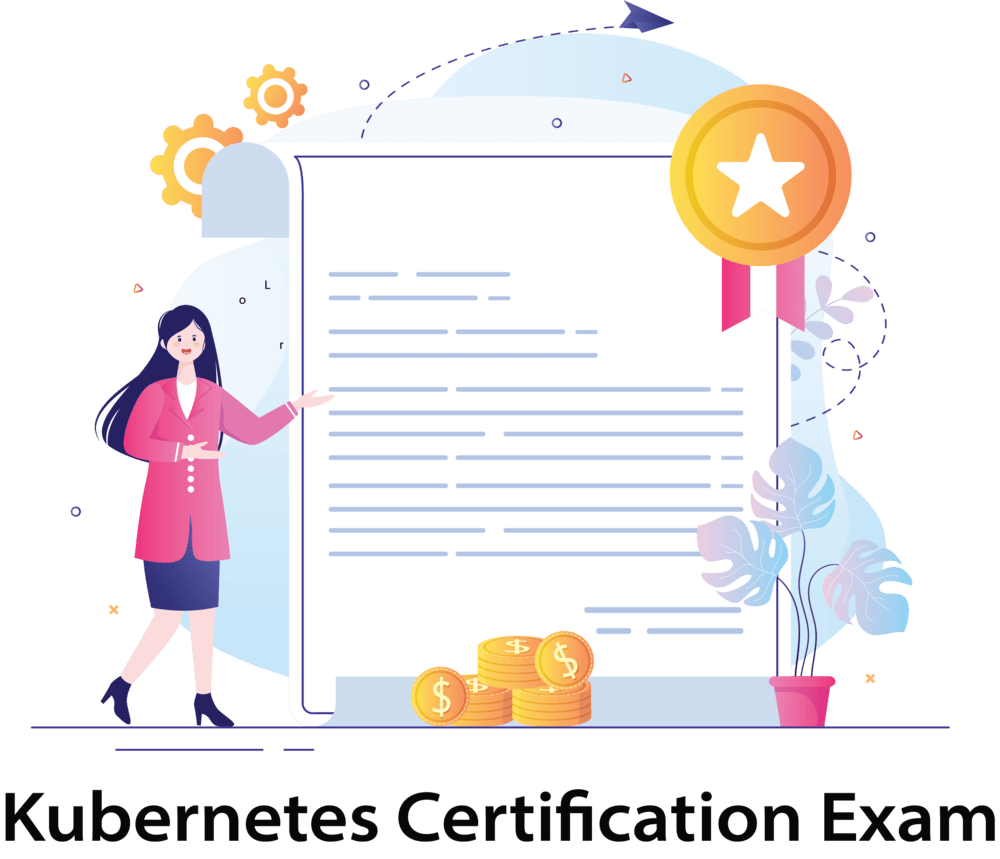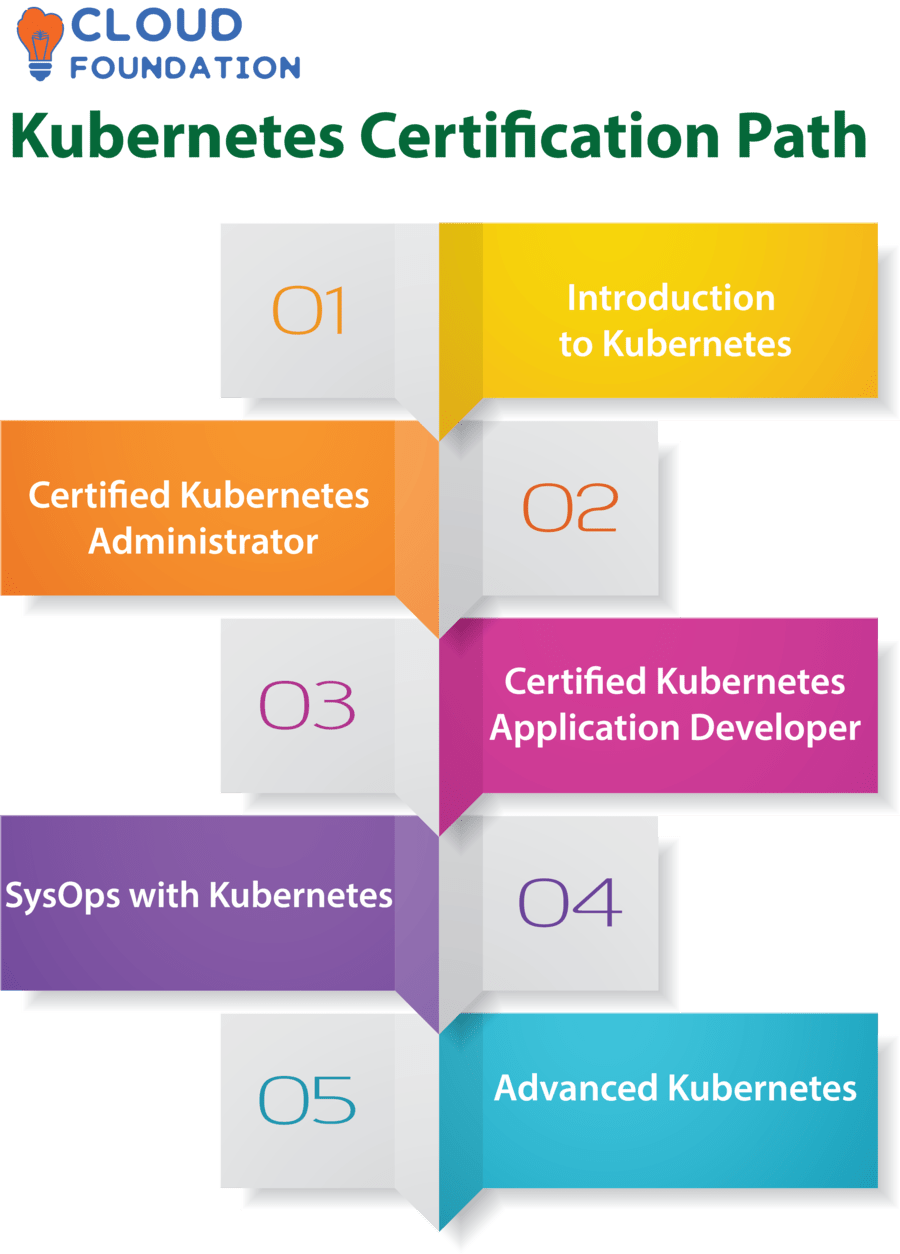10 Points to Consider for Kubernetes Certifications
Though I believe you already know about Kubernetes, allow me to provide you with a quick summary of its certification program. Let’s get underway now.
What is Kubernetes?
Kubernetes provides an extensible orchestration solution, with capabilities including deployment, service discovery, load balancing, autoscaling and automated distribution of new features and applications.
By deploying their applications using containers inside Kubernetes for deployment and scaling using Kubernetes customers benefit from highly powerful orchestration solutions that ensure consistent administration and scaling across several cloud providers and even on-premise.
This powerful orchestration solution also facilitates secure management and scaling solutions across any number of cloud providers/ on premise as well.
Types of Kubernetes Certifications or Kubernetes Certification List
The following are Types of Certifications on Kubernetes:

Kubernetes and Cloud Native Associate (KCNA)
The Cloud Native Computing Foundation (CNCF) and Linux Foundation teamed up to establish the Kubernetes and Cloud Native Associate (KCNA) certification, which measures an individual’s abilities when developing and overseeing cloud applications with Kubernetes container orchestration system.
Achieving Kubernetes architect certification will demonstrate their mastery of Kubernetes principles, cloud native designs and deployment best practices as well as methods for maintaining those applications over time.
For anyone working within cloud computing or container technologies this certification can prove their expertise while showing employers they understand what is expected when creating and overseeing applications using Kubernetes container orchestration system – essential if working within these industries!
Certified Kubernetes Application Developer (CKAD) or Kubernetes Developer Certification
It is designed to demonstrate someone’s knowledge and abilities for creating applications on Kubernetes CKAD certification. This professional certification program seeks to certify individuals in this arena.
Kubernetes can be utilized to design, deploy and troubleshoot cloud-native apps by those with Kubernetes Certification Developer certification from Cloud Native Computing Foundation (CNCF). To earn this distinction one must pass an exam set forth by this organization.
Certified Kubernetes Administrator (CKA) or Kubernetes Certification Administrator
It is an internationally recognized professional Kubernetes CKA Certification program which tests an individual’s abilities when managing applications on Kubernetes platform.
Kubernetes administrator Certification aims to assess an individual’s knowledge and aptitude in installing, configuring, running, upgrading, maintaining, and troubleshooting Kubernetes clusters.
As part of attaining certification through the Cloud Native Computing Foundation (CNCF), individuals must successfully pass two exams: Certified Kubernetes Administrator Exam administered by them as well as Kubernetes Security Certification exams administered by them.
Certified Kubernetes Security Specialist (CKS) or Kubernetes Security Certification
A person who demonstrates knowledge in protecting containerized applications using Kubernetes and has received formal recognition is known as a Certified Kubernetes Security Specialist (CKS).
Professionals who have achieved Kubernetes certification security from the Cloud Native Computing Foundation’s Containerized Kubernetes Service program should be equipped to audit, harden and understand the security features of Kubernetes clusters.
Are You Want to be Certified Knowledge Security (CKS)? In order to become one, a series of challenging tests that assesses security knowledge, system operations knowledge and application development knowledge must be passed successfully.
Who should get Kubernetes Certified
Anyone hoping to advance their career in cloud-native infrastructure, application development or operations would gain from becoming certified on Kubernetes.
Developers, administrators, operators and architects who must comprehend its principles for running applications on Kubernetes in particular would find this certification invaluable in standing out in positions requiring basic knowledge of Kubernetes.
Demand of Kubernetes Certified Professionals

With more businesses and institutions turning to these systems to set up and run containers on their infrastructures, Windows-based Kubernetes certification is in high demand.
Microsoft has made significant strides forward with Windows Server containerization, Windows Subsystem for Linux (WSL), and Powershell modules designed specifically to work with containerized apps, thus standardizing its Kubernetes-like solutions and container-based alternatives.
Kubernetes has quickly become one of the most in-demand containers due to its containerization, maturity, adaptability and portability features.
Furthermore, this application’s popularity stems from how Kubernetes interacts with cloud platforms as well as how well it meets different affinities and needs of different environments.
Kubernetes-enabled container work transforms containers into complex automated infrastructure with self-healing properties and remotely operable features, creating cutting-edge features in containerized infrastructure that offer unmatched capabilities.
Is Kubernetes Certification worth it OR Value of Kubernetes Certificate
A Kubernetes certificate serves two main functions. First, it allows authentication of users and apps within Kubernetes clusters as well as secure communication among components.
Furthermore, Kubernetes certificates allow strong user authentication/permission and encrypted transport of data across networks, meaning applications/workloads may be safely deployed, managed and monitored without fear of compromise of data or credentials being exposed over the network.
Finally, Kubernetes certificates aid organizations meet regulatory needs requirements while meeting access management to Kubernetes powered systems/ applications via Kubernetes certificates.
How hard is Docker and Kubernetes Certification

Docker and Kubernetes Certification can be both rewarding and difficult; its examination covers an expansive array of Kubernetes knowledge encompassing fundamental concepts as well as more advanced topics, including networking, scheduling and storage capabilities, principles and practices associated with application deployment as well as principles.
Most individuals will require substantial study time in order to pass the Kubernetes CKA exam; its process might last from weeks or even months depending on your expertise as well as commitment levels towards studying.
Although you have an option of taking all Kubernetes practice exams all at once if that works better! While exams can be completed all at once (even by scheduling time during preparation), for optimal success it is advised that study can occur over stages instead.
Kubernetes Certification Cost

The costs associated with Kubernetes administration certification depend on which certification you pursue: the Certified Kubernetes Application Developer (CKAD) exam costs $300; Certified Kubernetes Administrator (CKA) certification runs $500 – other associated course learning materials fees may also incur depending on individual circumstances.
Larger organizations may qualify for reduced or even free exams so for more details contact your workplace directly.
Best Kubernetes Certification Exam or Kubernetes Exam

Cloud Native Computing Foundation (CNCF) administers an industry-renowned certification exam for Kubernetes called the Kubernetes Certification Exam to test applicants knowledge and proficiency within this domain.
Exam questions focus on installation, networking security management.
Those who pass will receive a certificate recognizing their domain knowledge proficiency from CNCF.
How to get Kubernetes Certification
Study Kubernetes: Before embarking on your Kubernetes certification path, it’s essential that you learn its fundamentals first. Use online tutorials, blogs and free online courses as resources to do this.
Enroll in Kubernetes Training: Attend either KCA or CKAD certification training from an established organization,
Analyze your learning through hands-on practice, measure it against standards established for these tests (KCA or CKAD are the certification in Kubernetes levels),
Take and pass the final examination to become certified; KCA or CKAD levels exist depending on which certification on kubernetes path you take.
Select Your Specialisation: Following certification, choose an area of specialty within Kubernetes Certification.
Kubernetes Certification training
With Kubernetes training and certification courses, individuals may acquire the abilities and information needed to effectively use and administer Kubernetes clusters.
You’ll discover essential knowledge regarding security management, API usage and other features; cluster constructing/deployment/management processes as well as understanding/configuring networking protocols within Kubernetes.
Advanced features like authentication/authorization will also be covered as will monitoring/troubleshooting foundations as well as an overall functional understanding of Kubernetes architecture/components.
Kubernetes Certification path

Introduction to Kubernetes: For anyone embarking on Kubernetes certification journeys, step one is an introduction course designed to introduce Kubernetes.
This will cover its principles as well as essentials needed for getting up and running quickly with it.
Certified Kubernetes Administrator (CKA): This practical CKA Kubernetes exam certifies practitioners in terms of knowledge, skills and abilities necessary for them to fulfill the duties associated with being Kubernetes Administrators.
Certified Kubernetes Application Developer (CKAD): This practical exam certifies practitioners in their knowledge, skills and abilities required for creating cloud native and distributed apps on top of Kubernetes.
SysOps with Kubernetes: In this course, students gain an introduction to system administration’s duties related to using and installing Kubernetes, including its operational features such as security and monitoring.
Advanced Kubernetes: This course covers cutting-edge topics and techniques for using Kubernetes effectively within business settings, from setting up clusters and managing them through to deployment on public clouds.
Kubernetes Certification course
Kubernetes, a cloud native platform designed specifically to distribute and manage applications on an extremely scalable and dispersed environment, enables programs to distribute applications in such an environment with relative ease.
Many professionals enrolling in Kubernetes certification classes to stay abreast of its latest technologies.
Kubernetes certification courses provide developers and system administrators alike with an in-depth knowledge of its design, implementation and operations as well as practical experience through extensive laboratories and activities.
Professionals may acquire skills they require for installing, managing and debugging Kubernetes clusters through taking these courses.
Kubernetes Certification CKA and Kubernetes Certification CKAD are two prominent Kubernetes-specific programs. There are also generic certification programs in cloud native development and DevOps that may also apply, including Red Hat Certified Specialist in Containers and Kubernetes as well as Cloud Native Computing Foundation’s Certified Kubernetes Application Developer (CKAD).
No matter which certification for kubernetes program you opt for, they all equip you with the knowledge and abilities required for efficient application deployment and management in Kubernetes environments.
CNCF Kubernetes Certification Process

Understand Prerequisites for Certification (KCP): To be successful at KCP you need to know its prerequisites before participating.
Enroll: Once you understand all prerequisite subjects for certification programs, enrolling and taking the test are next steps to demonstrate your knowledge in them.
Take the test: Take your proficiency exam so as to demonstrate it through proficiency scores on each of its prerequisite subjects and the exam.
Get Certified: After passing your evaluation test successfully, if successful you will obtain certification.
Maintain certification: To maintain certification status periodically retake evaluation exams.
Kubernetes certifications provide you with an opportunity to demonstrate your technical expertise while investing in your future.
Not only can this lead to lucrative career prospects in cloud computing but you will gain greater understanding of technology as well as having proof of competency for potential employers.
With demand increasing daily for Kubernetes experts, now is certainly an opportune moment to become certified!
Check out the Kubernetes course blogs available on CloudFoundation to increase your understanding and expand on your technical know-how going forward.

Kiranmai
Author
“Bringing you the latest in tech news and insights to ignite your creativity & spark positive change – Welcome to my world of words”



